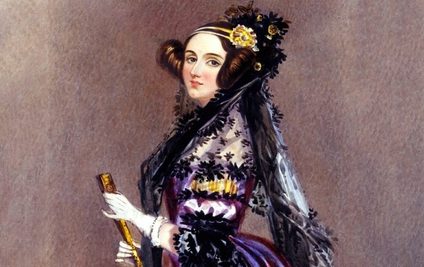Everybody loves Ada!

Ada Lovelace (1815-1852)
You've probably heard the name before – but what do you actually know about Ada Lovelace?
Ada Gordon was born in 1815 to a mathematician mother, Anne Isabella Noel Byron and poet father, George Gordon Byron – fun fact – commonly known as Lord Byron. Apparently Lady Byron wanted to avoid their child inheriting his 'artistic temperament' – so little Ada's childhood was filled with science, and maths. This helped to encourage a love of machines.
At 19, Ada Gordon married William King and when he was later made Earl of Lovelace, she became Lady Ada King, Countess of Lovelace.
Lovelace met Charles Babbage, an inventor and mechanical engineer, in
1833 and they became good friends – presumably bonding over a shared
love of nerding-out about maths and machinery. Lovelace was
super-interested in Babbage's plans for a device called the Analytical
Engine, which had all the hallmarks of a modern computer.
They didn't
build it, but Lovelace studied the plans and, while translating everything into French (multi-talented!), wrote additional copious notes and
comments about how the machine could work. Lovelace described how codes could
be created so that the device could handle letters and symbols, as well
as numbers.
She also developed a method for it to repeat a series of
instructions; known as 'looping' it's a process still used in computing today.
Her vital work on the Analytical Engine was published in 1843 – when she was just 27 years old – and inspired Alan Turing's work on the first modern computers in the 1940s.
Further reading about Ada Lovelace:
Ada's List – A community of professional women and non-binary people who work in the tech sector
Ada Lovelace Day, Tue 11 October – An international celebration of the achievements of women in science, technology, engineering and maths (STEM)
Ada Lovelace Institute – An independent research institute with a mission to ensure data and AI work for people and society.
Lovelace interviews – series of interviews with University of Oxford academics about Ada Lovelace.
